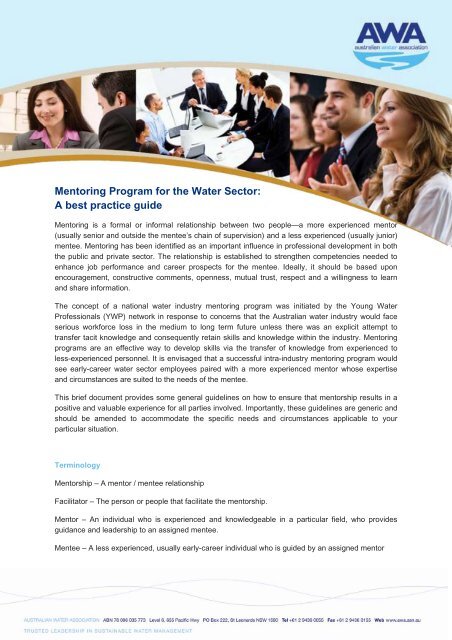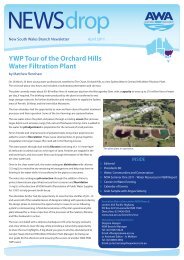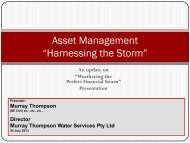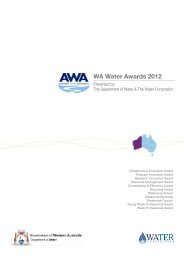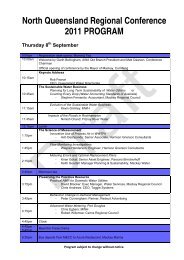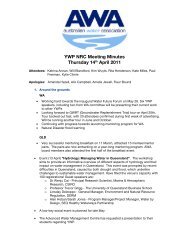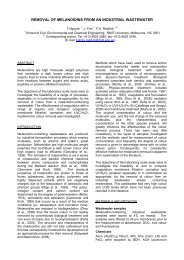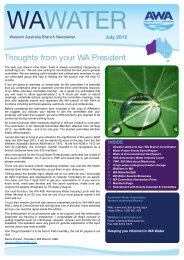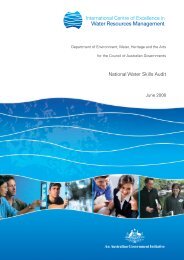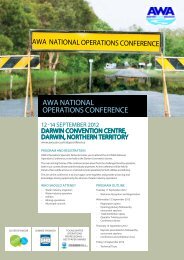Mentoring Program for the Water Sector: A best practice guide
Mentoring Program for the Water Sector: A best practice guide
Mentoring Program for the Water Sector: A best practice guide
Create successful ePaper yourself
Turn your PDF publications into a flip-book with our unique Google optimized e-Paper software.
<strong>Mentoring</strong> <strong>Program</strong> <strong>for</strong> <strong>the</strong> <strong>Water</strong> <strong>Sector</strong>:<br />
A <strong>best</strong> <strong>practice</strong> <strong>guide</strong><br />
<strong>Mentoring</strong> is a <strong>for</strong>mal or in<strong>for</strong>mal relationship between two people—a more experienced mentor<br />
(usually senior and outside <strong>the</strong> mentee’s chain of supervision) and a less experienced (usually junior)<br />
mentee. <strong>Mentoring</strong> has been identified as an important influence in professional development in both<br />
<strong>the</strong> public and private sector. The relationship is established to streng<strong>the</strong>n competencies needed to<br />
enhance job per<strong>for</strong>mance and career prospects <strong>for</strong> <strong>the</strong> mentee. Ideally, it should be based upon<br />
encouragement, constructive comments, openness, mutual trust, respect and a willingness to learn<br />
and share in<strong>for</strong>mation.<br />
The concept of a national water industry mentoring program was initiated by <strong>the</strong> Young <strong>Water</strong><br />
Professionals (YWP) network in response to concerns that <strong>the</strong> Australian water industry would face<br />
serious work<strong>for</strong>ce loss in <strong>the</strong> medium to long term future unless <strong>the</strong>re was an explicit attempt to<br />
transfer tacit knowledge and consequently retain skills and knowledge within <strong>the</strong> industry. <strong>Mentoring</strong><br />
programs are an effective way to develop skills via <strong>the</strong> transfer of knowledge from experienced to<br />
less-experienced personnel. It is envisaged that a successful intra-industry mentoring program would<br />
see early-career water sector employees paired with a more experienced mentor whose expertise<br />
and circumstances are suited to <strong>the</strong> needs of <strong>the</strong> mentee.<br />
This brief document provides some general <strong>guide</strong>lines on how to ensure that mentorship results in a<br />
positive and valuable experience <strong>for</strong> all parties involved. Importantly, <strong>the</strong>se <strong>guide</strong>lines are generic and<br />
should be amended to accommodate <strong>the</strong> specific needs and circumstances applicable to your<br />
particular situation.<br />
Terminology<br />
Mentorship – A mentor / mentee relationship<br />
Facilitator – The person or people that facilitate <strong>the</strong> mentorship.<br />
Mentor – An individual who is experienced and knowledgeable in a particular field, who provides<br />
guidance and leadership to an assigned mentee.<br />
Mentee – A less experienced, usually early-career individual who is <strong>guide</strong>d by an assigned mentor
Best <strong>practice</strong> mentorships<br />
Mentorships should involve a facilitator, a mentor and a mentee. Depending on <strong>the</strong> specific<br />
circumstances, a mentorship should follow <strong>the</strong> procedure below:<br />
• An individual interested in becoming a mentee approaches a facilitator with a view to being<br />
paired with a mentor<br />
• The facilitator considers who <strong>the</strong> mentee might be <strong>best</strong> paired with and initiates a meeting<br />
between <strong>the</strong> two<br />
• The first meeting occurs which involves a discussion about mentoring, <strong>the</strong> signing of a<br />
mentorship agreement, and <strong>the</strong> negotiation of a communication schedule<br />
• Subsequent meetings should occur as agreed between <strong>the</strong> mentee and mentor in <strong>the</strong>ir first<br />
meeting<br />
• At <strong>the</strong> second meeting, a more detailed plan of action can be developed, where goals <strong>for</strong> <strong>the</strong><br />
mentee can be broken down into specific tasks. Tasks <strong>for</strong> <strong>the</strong> mentee to complete by <strong>the</strong> next<br />
meeting should be agreed upon<br />
• At <strong>the</strong> third and subsequent meetings, <strong>the</strong> mentee should present <strong>the</strong> results of <strong>the</strong> set tasks.<br />
• From <strong>the</strong> third meeting onwards, mentor and mentee should discuss <strong>the</strong> progress made by<br />
<strong>the</strong> mentee (and include obstacles met in trying to achieve desired goals)<br />
• The mentor can <strong>the</strong>n provide feedback and analysis of issues, and offer advice and guidance<br />
<strong>for</strong> future actions<br />
• The mentor and mentee <strong>the</strong>n negotiate <strong>the</strong> next tasks to be undertaken and decide on <strong>the</strong><br />
next meeting date<br />
• Completion of <strong>the</strong> mentorship occurs ei<strong>the</strong>r at <strong>the</strong> negotiated completion date or at <strong>the</strong><br />
discretion of ei<strong>the</strong>r party. This meeting should involve <strong>the</strong> facilitator and can be used to review<br />
<strong>the</strong> process and outcomes.<br />
2
Best <strong>practice</strong> <strong>for</strong> <strong>the</strong> facilitator<br />
The facilitator enables <strong>the</strong> mentorship and provides a point of contact <strong>for</strong> both parties. Their role is to<br />
provide an appropriate pairing, ensure a program <strong>for</strong> interaction is developed and adhered to,<br />
facilitate negotiation if applicable, monitor <strong>the</strong> relationship’s progress, and provide evaluation once <strong>the</strong><br />
mentorship is complete.<br />
Some general tips <strong>for</strong> <strong>the</strong> facilitator:<br />
• Ensure you give sufficient thought to <strong>the</strong> pairing process. Consider <strong>the</strong> circumstances of both<br />
<strong>the</strong> mentor and mentee and ensure <strong>the</strong>se are conducive to providing an effective mentorship.<br />
Research shows that <strong>the</strong> most effective mentors are sourced from outside <strong>the</strong> mentee’s chain<br />
of supervision. Things to consider when pairing a mentor and mentee include:<br />
- The duration both are available<br />
- The nature of <strong>the</strong>ir roles<br />
- The skills <strong>the</strong> mentor can offer in relation to <strong>the</strong> skills <strong>the</strong> mentee seeks<br />
- The frequency with which both are willing to meet<br />
• Involve <strong>the</strong> mentee in <strong>the</strong> pairing process in order to ensure <strong>the</strong>ir expectations are addressed.<br />
This may also be an opportunity to discuss <strong>the</strong> concept of mentoring if <strong>the</strong> mentee’s<br />
expectations are unreasonable.<br />
• Once a pairing is achieved, arrange a meeting so <strong>the</strong> two can be introduced. This meeting<br />
should include:<br />
- A series of questions asked of both to ensure <strong>the</strong> pairing is appropriate<br />
- A discussion of <strong>the</strong> concept of mentoring to ensure expectations are realistic and<br />
compatible<br />
- Negotiation of a mutually suitable meeting or communication schedule<br />
- A <strong>for</strong>mal mentorship agreement which should cover expectations of both, duration of <strong>the</strong><br />
relationship, objectives of <strong>the</strong> mentorship, and any applicable confidentiality clauses.<br />
• It is ultimately <strong>the</strong> role of <strong>the</strong> mentor and mentee to negotiate a mutually serviceable<br />
mentorship. Avoid encouraging <strong>the</strong>m to achieve unrealistic goals, but ra<strong>the</strong>r help facilitate and<br />
monitor <strong>the</strong> agreed aims and timeline.<br />
• You should be available to both parties in <strong>the</strong> instance that ei<strong>the</strong>r feels <strong>the</strong> relationship is not<br />
working.<br />
3
Best <strong>practice</strong> <strong>for</strong> <strong>the</strong> mentor<br />
The mentor enters into an agreement with a mentee in order to provide expertise and practical<br />
experience. In addition to acting as a sounding board <strong>for</strong> <strong>the</strong> mentee, mentors provide industry<br />
knowledge, an in-depth understanding of networking and protocol and advice on career progression.<br />
Some general tips <strong>for</strong> <strong>the</strong> mentor:<br />
• In providing <strong>the</strong> mentee with career guidance, <strong>the</strong> mentor might cover a range of areas, such<br />
as: <strong>the</strong> mentee’s resume and job searching, per<strong>for</strong>mance reviews, technical skills,<br />
professional development and fur<strong>the</strong>r study or training, work/life balance, job satisfaction,<br />
interpersonal and networking skills, and career management and planning.<br />
• A mentorship should not be viewed as only benefiting <strong>the</strong> mentee. Mentorships provide<br />
mentors with <strong>the</strong> opportunity to invest in <strong>the</strong> lives of o<strong>the</strong>rs and make a contribution to <strong>the</strong>ir<br />
industry. Mentors can also inadvertently learn from <strong>the</strong> mentee.<br />
• Mentors must have: good listening skills, an inquisitive mind, a passion <strong>for</strong> <strong>the</strong>ir work and<br />
industry, <strong>the</strong> ability to provide constructive and positive feedback, patience, and good<br />
organisational skills.<br />
• Mentors are not required to provide all <strong>the</strong> answers, instead <strong>the</strong> mentor encourages <strong>the</strong><br />
mentee to use <strong>the</strong>ir available resources to identify solutions. It is <strong>the</strong>re<strong>for</strong>e, a partnership<br />
where <strong>the</strong> mentor and mentee work in a collaborative manner. Sometimes it might be easier<br />
to simply provide <strong>the</strong> mentee with <strong>the</strong> answers, but this is not conducive to a meaningful<br />
learning experience.<br />
• Mentees may be apprehensive about contacting <strong>the</strong>ir mentor, not wanting to intrude on <strong>the</strong><br />
mentor's time or resources. Mentors can help alleviate this concern by periodically <strong>for</strong>warding<br />
encouraging emails to give <strong>the</strong> mentee confidence to maintain contact.<br />
• Ensure you have a good grasp of <strong>the</strong> mentee’s circumstances and structure your advice and<br />
feedback accordingly. Convey practical advice in terms of <strong>the</strong> mentee’s career development<br />
goals. This means continually asking questions of <strong>the</strong> mentee, not making assumptions.<br />
• Understand that mentoring is a commitment and you should be in a position where you can<br />
be available to <strong>the</strong> mentee in line with <strong>the</strong> mentorship agreement. There may also be<br />
instances outside of this agreement when <strong>the</strong> mentee approaches you with questions or<br />
issues. You should be open to this possibility, but should approach <strong>the</strong> mentorship facilitator if<br />
<strong>the</strong> mentee becomes too demanding.<br />
• Provide feedback wherever possible, and bear in mind that as an early-career employee,<br />
feedback should be conveyed in a constructive and sensitive manner.<br />
• Get <strong>the</strong> mentee active. Involve <strong>the</strong>m in appropriate meetings, ei<strong>the</strong>r as an observer or as a<br />
presenter and introduce <strong>the</strong>m to relevant contacts. Arrange projects or assignments <strong>for</strong> <strong>the</strong>m<br />
if appropriate and achievable in terms of <strong>the</strong> mentorship agreement.<br />
• Consult <strong>the</strong> mentorship facilitator if you are unhappy with <strong>the</strong> arrangement<br />
4
Best <strong>practice</strong> <strong>for</strong> <strong>the</strong> mentee<br />
The role of <strong>the</strong> mentee is to take advantage of <strong>the</strong> opportunities offered <strong>the</strong>m by <strong>the</strong>ir mentor.<br />
Mentees enter into an agreement with a mentor in order to gain knowledge and experience. As such,<br />
<strong>the</strong>y should be open to new in<strong>for</strong>mation and learning experiences. Mentees should strike a careful<br />
balance between being critical and inquisitive in relation to <strong>the</strong> guidance offered by <strong>the</strong> mentor, and<br />
being respectful of <strong>the</strong> service <strong>the</strong>y are providing.<br />
Some general tips <strong>for</strong> <strong>the</strong> mentee:<br />
• It is <strong>the</strong> mentee who is expected to drive <strong>the</strong> mentoring relationship by developing <strong>the</strong> agenda<br />
or discussion points <strong>for</strong> <strong>the</strong> mentor to comment on. It is <strong>the</strong> mentee's responsibility to build<br />
rapport with <strong>the</strong> mentor and to ask <strong>the</strong> right questions, seek relevant in<strong>for</strong>mation and utilise<br />
<strong>the</strong> connections given by <strong>the</strong> mentor.<br />
• Consult with your employee if appropriate to advise <strong>the</strong>m of your intention to enter into a<br />
mentoring program.<br />
• Mentees should be: interested in developing <strong>the</strong>ir careers; good listeners and communicators;<br />
able to take responsibility <strong>for</strong> <strong>the</strong>ir own development; open to receiving feedback; willing to<br />
accept challenges; positive about change and growth; and able to set goals and work towards<br />
<strong>the</strong>m.<br />
• Give great thought to what you want out of a mentorship prior to approaching a facilitator.<br />
Consider your strengths and weaknesses, what you would like to learn and where you want<br />
your career to go.<br />
• Prepare an individual development plan. Start with a skeleton plan prior to meeting with <strong>the</strong><br />
facilitator, and <strong>the</strong>n use <strong>the</strong> first meeting with your mentor to flesh out greater detail. Ensure<br />
your objectives are specific, measurable and achievable.<br />
• Take an active role in <strong>the</strong> initial meeting with your prospective mentor. Ask <strong>the</strong>m questions<br />
such as:<br />
- What can you, as a mentor, bring to a mentoring relationship?<br />
- What positions have you held in <strong>the</strong> past?<br />
- What qualifications or training do you have?<br />
- How much time do you anticipate being able to spend working with me?<br />
- What type of communication methods (i.e. phone, in person, email) would you prefer <strong>for</strong><br />
this mentoring relationship?<br />
• Be scrupulous in <strong>the</strong> notes you take during your mentorship.<br />
• Ask questions.<br />
• Honour your commitments to <strong>the</strong> mentorship in terms of attendance at meetings and<br />
communication with <strong>the</strong> facilitator and mentor. Be courteous and provide advanced notice if<br />
you cannot honour a meeting commitment.<br />
5
• Ask <strong>for</strong> feedback often and take it onboard in a constructive manner. Remember that you are<br />
in a mentorship to learn and receive feedback so avoid taking this personally or getting<br />
defensive.<br />
• Make <strong>the</strong> most of opportunities offered such as networking possibilities, attendance at<br />
meetings and seminars etc.<br />
• Revisit your individual development plan often and assess <strong>the</strong> extent to which you are on<br />
track. Make adjustments where appropriate.<br />
• Consult <strong>the</strong> mentorship facilitator if you are unhappy with <strong>the</strong> arrangement.<br />
<strong>Mentoring</strong> programs foster skills enhancement and in<strong>for</strong>mation sharing, while providing a means to<br />
transfer valuable experience and expertise from experienced to early-career employees. <strong>Mentoring</strong><br />
programs can offer a plethora of benefits <strong>for</strong> all parties involved so long as <strong>the</strong> systems are in place to<br />
ensure its success. Provided <strong>the</strong> individuals involved follow <strong>best</strong> <strong>practice</strong>, <strong>the</strong> water industry should<br />
benefit greatly from this initiative.<br />
6
SAMPLE MENTORSHIP AGREEMENT<br />
We are voluntarily entering into a [INSERT TIME PERIOD] <strong>for</strong>mal mentoring partnership, between<br />
[INSERT MENTEE] from [INSERT ORGANISATION] and [INSERT MENTOR] from [INSERT<br />
ORGANISATION]. The following highlights <strong>the</strong> features of our partnership:<br />
• <strong>Mentoring</strong> partnership objectives<br />
As a result of working with a mentor I would like to accomplish <strong>the</strong> following:<br />
_________________________________________________________________________________<br />
_________________________________________________________________________________<br />
_________________________________________________________________________________<br />
• Specific role of <strong>the</strong> mentor<br />
I will support my mentee’s developmental process by:<br />
_________________________________________________________________________________<br />
_________________________________________________________________________________<br />
_________________________________________________________________________________<br />
• The logistics of our meetings will generally include <strong>the</strong> following:<br />
When:<br />
_________________________________________________________________________________<br />
Where: __________________________________________________________________________<br />
How long: ________________________________________________________________________<br />
Frequency: _______________________________________________________________________<br />
Who is responsible <strong>for</strong> initiating: _______________________________________________________<br />
• We will honor <strong>the</strong> following confidentiality agreement:<br />
_________________________________________________________________________________<br />
_________________________________________________________________________________<br />
_________________________________________________________________________________<br />
• The agreement may be terminated at any time by ei<strong>the</strong>r <strong>the</strong> mentee or mentor.<br />
Signature:<br />
_____________________________________<br />
MENTEE<br />
Signature:<br />
___________________________________<br />
MENTOR<br />
Signature:<br />
_____________________________________<br />
FACILITATOR<br />
7


